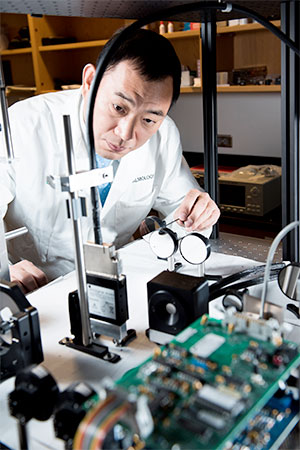 Yuhua Zhang, Ph.D., assistant professor in the Department of Ophthalmology at the University of Alabama at Birmingham, has been awarded a $1,837,500 grant from the National Eye Institute to characterize extracellular lesions associated with age-related macular degeneration, a common, vision-stealing disease.
Yuhua Zhang, Ph.D., assistant professor in the Department of Ophthalmology at the University of Alabama at Birmingham, has been awarded a $1,837,500 grant from the National Eye Institute to characterize extracellular lesions associated with age-related macular degeneration, a common, vision-stealing disease.
AMD affects more than 10 million Americans and can lead to severe vision impairment. To date, effective treatments are available for only the late stages of disease. Despite its prevalence, the factors that lead to development and progression of AMD are not completely clear.
Zhang aims to expand scientific understanding of the disease by characterizing subretinal drusenoid deposits, lesions recently recognized as conferring risk for progression to advanced AMD. Zhang will use an instrument he built to study retina changes related to these lesions at an unprecedented resolution. He seeks to develop imaging-based biomarkers and biometrics for assessing the progression of AMD. New knowledge about the role of SDD could help inform novel approaches to treatment.
Zhang, an optics engineer with expertise in adaptive optics imaging, has been mentored by two eminent scientists in the Department of Ophthalmology, Christine A. Curcio, Ph.D., and Cynthia Owsley, Ph.D. Curcio was the first to identify SDD in human donor tissue, and Zhang’s work builds upon Curcio’s findings.
“These lesions may impact vision by preventing the traffic of key nutrients to and wastes from the light-sensing photoreceptors and by directly exposing these cells to toxic compounds,” Curcio said. “They also may stimulate the ingrowth of abnormal blood vessels and indicate changes in the underlying blood supply to the photoreceptors.”
| AMD affects more than 10 million Americans and can lead to severe vision impairment. To date, effective treatments are available for only the late stages of disease. Despite its prevalence, the factors that lead to development and progression of AMD are not completely clear. |
A generous donation by Songs for Sight, an organization founded by Alie B. Gorrie to raise awareness and understanding for low vision, helped jump-start Zhang’s initial research after his recruitment to UAB in 2008. This $170,000 strategic investment paved the way for the new grant from the NEI for nearly $1.8 million.
“The department is dedicated to the establishment of a translational research team that will develop novel cures and biomarkers for macular degeneration,” said Chris Girkin, M.D., professor and chair of Ophthalmology. “The efforts of Drs. Zhang, Curcio and Owsley, along with others in our department, represent critical steps in these efforts to stamp out this blinding disease.”